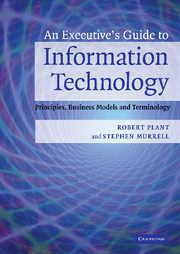Book contents
- Frontmatter
- Contents
- Introduction
- A ACM (Association for Computing Machinery) to Audio
- B Backup to Business process re-engineering
- C C, C++, C# to Cracking
- D Database to Dynamic web pages
- E e-Commerce/e-business to European Union Directive on Privacy and Electronic Commerce 2002
- F Fiber optics to Fuzzy logic
- G to H Global positioning system to Hypertext, HTML
- I ICANN (Internet Corporation for Assigned Names and Numbers) to ISP (Internet service provider)
- J to L Java to Logic programming
- M Machine learning to Multicast
- N Natural language processing (NLP) to Normalization
- O Object-oriented to Outsourcing
- P Packet switching and circuit switching to Public key-private key
- Q to R Quantum computing to RSS (Really simple syndication)
- S Sarbanes-Oxley Act of 2002 (SOX) to Structured design methodologies
- T to U T-Carrier to URL (Uniform resource locator)
- V Value added network (VAN) to Voice over IP (VoIP)
- W W3C (the World Wide Web Consortium) to WYSIWYG
- X to Z X.12 to Zip
- Index
- References
J to L - Java to Logic programming
Published online by Cambridge University Press: 17 May 2010
- Frontmatter
- Contents
- Introduction
- A ACM (Association for Computing Machinery) to Audio
- B Backup to Business process re-engineering
- C C, C++, C# to Cracking
- D Database to Dynamic web pages
- E e-Commerce/e-business to European Union Directive on Privacy and Electronic Commerce 2002
- F Fiber optics to Fuzzy logic
- G to H Global positioning system to Hypertext, HTML
- I ICANN (Internet Corporation for Assigned Names and Numbers) to ISP (Internet service provider)
- J to L Java to Logic programming
- M Machine learning to Multicast
- N Natural language processing (NLP) to Normalization
- O Object-oriented to Outsourcing
- P Packet switching and circuit switching to Public key-private key
- Q to R Quantum computing to RSS (Really simple syndication)
- S Sarbanes-Oxley Act of 2002 (SOX) to Structured design methodologies
- T to U T-Carrier to URL (Uniform resource locator)
- V Value added network (VAN) to Voice over IP (VoIP)
- W W3C (the World Wide Web Consortium) to WYSIWYG
- X to Z X.12 to Zip
- Index
- References
Summary
Foundation concept: Programming language.
Definition: A popular object-oriented programming language, derived from C++ but with many significant differences, some of them improvements.
Not to be confused with: JavaScript.
Overview
For many years, C++ was the only programming language available for largescale programming projects that properly supported modern programming methodologies, apart from the very unpopular Ada. For all its popularity, which continues unabated, C++ has many faults, which can not possibly be rectified without changing it into a fundamentally different kind of language. C++ has many safety features, which would go a long way toward making programs more reliable, but none are enforced; programmers can and do override them at will. C++ carries with it the unfortunate legacy of older languages (most of the old C language survives as part of C++), and it almost encourages an unstructured overcomplicated style of programming. The language itself is exceptionally complex (the official standard fills 774 pages), and very few expert programmers are aware of all of its rules.
Java was developed by a small team at Sun Microsystems, and released to the public in 1995. It was intended to do many good things: remove or replace the worst features of C++, be a relatively simple language that can be completely known and understood, provide safety features that programmers can not choose to ignore, fully embody the object-oriented design methodology, provide automatic cross-platform compatibility for all programs, provide a uniform simplified access to “windowy” graphical user interfaces, be “internet-friendly,” provide an extensive thoroughly tested library of programming utilities, and allow secure execution, guaranteeing that programs from untrusted sources can not do any harm.
- Type
- Chapter
- Information
- An Executive's Guide to Information TechnologyPrinciples, Business Models, and Terminology, pp. 191 - 206Publisher: Cambridge University PressPrint publication year: 2007



